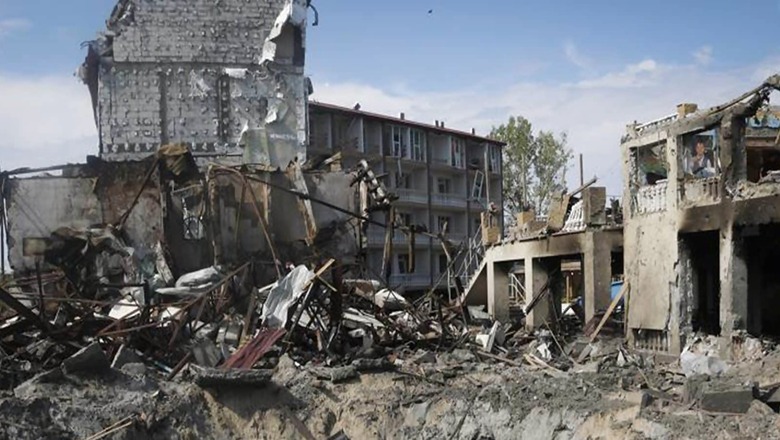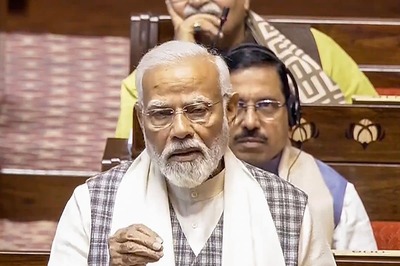
views
Seven months is not a long time in history but the world has been on the edge during the last seven months beginning with the invasion of Ukraine in February-end. The war was not predicted, it caught most analysts off guard and can be termed a ‘strategic shock’. When the invasion did take place, the initial predictions were that it would be swift and Russia would capture Kyiv and install a pro-Russian government in place of President Zelenskyy.
Neither of these has happened. Instead, we witnessed Russian occupation of large parts of the Eastern region, which incidentally is mainly the Russian-speaking region of Ukraine, and the capture of key ports on the Black Sea less Odessa. The opinions world over then were that Russia would control the area up to the Dnieper River and deny access to the Black Sea.
However, the latest development, as the conflict drags on, is that Russian forces are stuck in a conflict in built-up areas where attrition and not manoeuvre is the rule. In urban battles as the opportunity for manoeuvre seems to have evaporated, the Russian Armed Forces are now facing a counter-offensive and have called up their reservists. Though these all point to a collapse of Russia’s initial plans, the counter-offensive is unlikely to completely evict Russian troops and restore a status quo ante. However, the conflict is far from over and President Putin has also conducted a referendum in the captured territories to integrate them with Russia.
Russia’s ongoing invasion of Ukraine is the largest armed conflict in Europe since World War II and has fundamentally altered the continent’s security landscape. It has undermined European and global security and stability. What the conflict has achieved is that it has transformed our views on military strategy and operations, nuclear signaling, operational planning, diplomacy, and international relations, energy and economic security, and the use of technology in its wake. Modern technology on the battlefield is also upending assumptions of how wars should be fought.
The West feels that Putin poses an existential threat to the rules-based international order as also to Ukraine. The opinion is that Russia escalates tensions when it sees a weakness and withdraws when confronted with strength. There is no doubt that Russia felt that the expansion of NATO Eastwards was against its interests but at the same time, it must have perceived a ‘decline in US power’ and the US commitment in defending Ukraine which was not part of NATO. The hasty withdrawal from Afghanistan and the domestic state in US towards the end of President Trump’s tenure would have strengthened this feeling. President Putin believed he could invade his neighbour without serious consequences.
He, therefore, remained undeterred by the statements emanating from the West regarding safeguarding Ukrainian territorial sovereignty. In March this year, while examining the parallels between Taiwan and Ukraine, the Centre for Strategic & International Studies (CSIS) wrote; “China has become ever more confident about the assessment that the US is in decline, and that Western democracies have failed”.
Russia would have also seen a shift in Europe post the breakup of the Soviet Union due to a complacency that has set in by sidelining their security capabilities and concentrating more on welfare measures. But the truth remains that peace, prosperity and stability cannot happen without security.
Many policymakers felt that the threat of economic sanctions would act as a deterrence to Russian ambitions in Ukraine. But territorial control far outweighed the potential harm to the Russian economy. Ironically, the rouble has not collapsed and an increase in oil prices has in fact strengthened their foreign reserves. At the start of the conflict one dollar was approximately 135 roubles; today, it is 61 roubles and that is after the dollar has strengthened vis-a-vis most other currencies. For example, the rupee, which was at Rs 75 to the dollar at the start of the conflict, is now at Rs 82 to the dollar, translating into a drop of approximately ten per cent.
In fact, due to globalization, economic collapse has been witnessed in weak economies such as Pakistan and Sri Lanka and inflationary trends are being felt all over the globe and a recession is being predicted. Ultimately, troops and weapons had to be moved to the Eastern edges of NATO borders to deter Russia and prevent any further miscalculation. There is no shortcut to ‘boots on the ground’, sanctions cannot be the primary tool to deter aggression.
There is a view that sanctions have long-term implications. This was strengthened by the collapse of the Soviet Union. Sanctions were imposed post the invasion of Afghanistan in 1979. This resulted in the denial of Western technology and access to the Western financial markets and the ultimate collapse of an unreformed economy. Another view is that spiraling defence expenditure was the primary reason for the economic collapse. However, there is no denying the fact that outcomes of sanctions take time to give the desired results and no tactical advantage accrues from them.
Strategic communication is another vital aspect. It is getting increasingly difficult to distinguish ‘truth’. The fact is that ‘likes’ and ‘viewers’ are more important than ‘facts’ and there is a sense that Russia has lost dominance over the narrative.
“The very ‘rules of war’ have changed. The role of non-military means of achieving political and strategic goals has grown, and, in many cases, they have exceeded the power of force of weapons in their effectiveness”, is what General Valery Gerasimov, Russia’s Chief of the General Staff, said in February 2013 and this statement is very relevant in the current conflict.
One of the most challenging aspects of the rapidly evolving information environment is the growing impact and proliferation of stratagems by state and non-state actors to control the narrative surrounding their operations. Often using commercial capabilities, they disseminate biased, and false information using digital technologies and access to global audiences to recruit, gain support and to exploit, disrupt, and de-legitimise operations.
Weaponised information is used not only to undermine and discredit the opponents but also to disorient and polarise the recipient. The digital revolution offers unprecedented capabilities through which states can disseminate disinformation. The digital age, with its global interconnections, is an era in which digital information attacks in the form of bytes has become an omnipresent security concern.
Decades of economic integration with the West through trade, investments have also failed to avoid conflict. Europe was dependent on Russia for gas, this in turn helped fuel the industries in Europe and there was also a switch from nuclear energy to gas. Germany had also invested a large sum of money in the Nord Stream pipeline. But now the Nord Stream pipeline has been severely damaged and Russia is also threatening to turn off the gas. The attacks on the pipeline demonstrate the vulnerability of critical infrastructure, the damage hybrid attacks can wreak, and the difficulty of preventing and responding to them.
Some have called it an act of sabotage and Germany, Sweden, and Denmark are still investigating the origins of the Nord Stream explosions and leak. Deep-sea pipeline ruptures are extremely rare in the absence of a major seismographic event such as an earthquake, and causing damage to a pipeline at a depth of 80 meters requires advanced technical capabilities. It is not yet known if Russia sabotaged its own pipelines or if it was done by the US, but the space between peace and war is no longer identifiable, and “war” encompasses a variety of acts including economic warfare. The vulnerability of critical infrastructure has no doubt been highlighted by these ruptures.
The issue will no doubt get compounded with the approaching of winter where heating is most essential. A shift in energy dependence from Russia is not going to be easy, will be expensive and will take time. In fact, increasing energy prices coupled with shortages and uncertainties may force some European countries to fall back on Russian energy supplies.
As the war has serious economic consequences, the EU leaders had agreed at the informal summit in Versailles in early March to bolster European economic resilience, radically reduce energy imports from Russia and move ahead with a serious strengthening of European defence.
The conflict in Ukraine has no doubt generated a greater sense of urgency about building a stronger, more capable NATO in the field of security and defence. Ground forces, and particularly mechanised forces, remain the most powerful expression of a nation’s willingness to fight. Their deployment signals a deterrent to adversaries that remains unmatched.
In the end, victory is getting more difficult to define and the tools to achieve that are increasingly blurred. The contours of conflict are constantly changing and throwing up new challenges with the dangers being faced being unprecedented in their complexity. However, disinvestment from hard power as far as Europe is concerned is one of the lessons that has emerged as ‘strong conventional forces’ continue to remain the dominant language to ensure security.
Read all the Latest Opinions here



















Comments
0 comment